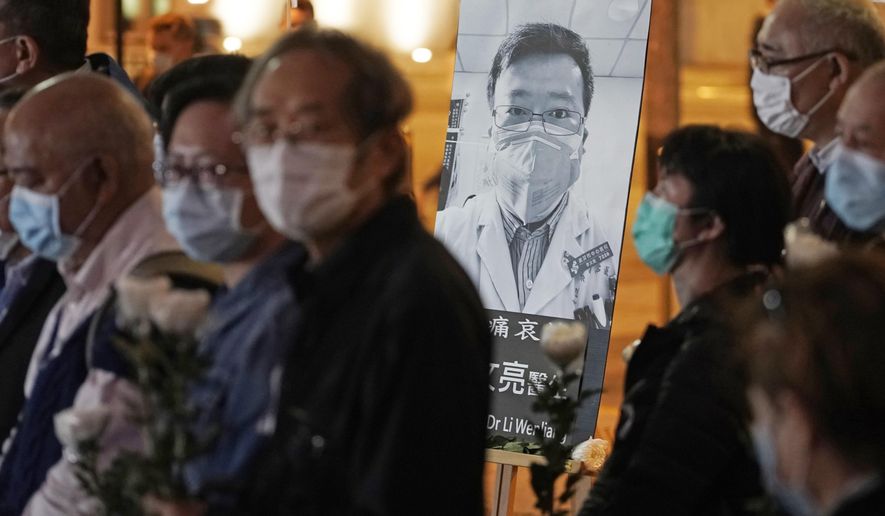The medical doctor who tried to sound the alarm on the initial outbreak of COVID-19 in late 2019 and later died from the disease was remembered Monday, two years after Chinese authorities forced him to confess to making illegal internet statements that reflected badly on the country.
Li Wenliang, an ophthalmology doctor at Wuhan Central Hospital, was among the first to send a message to an online group of friends and medical doctors warning of the outbreak of a new deadly disease that appeared to be a new strain of the SARS virus that hit China 18 years earlier.
“[Seven] cases of SARS were diagnosed in the South China Fruit and Seafood Market and were isolated in the emergency department of our hospital,” Dr. Li wrote on WeChat, the Chinese social media and messaging site, on Dec. 30, 2019.
Two other doctors also sounded the alarm in December 2020, including Liu Wen, a neurologist at the Wuhan Central Hospital who noted that a case of infectious viral pneumonia was diagnosed in the Houhu district. “SARS has been basically confirmed,” he said, adding that medical workers should adopt protective measures to avoid infection.
A third doctor, Xie Linka, at the Cancer Center of Wuhan Union Medical College Hospital, took to WeChat to warn of an outbreak of “unexplained pneumonia (similar to SARS).”
The posts triggered an immediate crackdown by Chinese government censors who blocked all posts using the word “Wuhan unknown pneumonia,” “SARS variation,” “Wuhan Seafood Market,” and others related to the virus outbreak. Beijing would go on to face global criticism for its lack of openness and handling of the origins and early outbreak of the pandemic.
On Jan. 1, 2020, eight medical doctors, including Dr. Li, were arrested by security police, interrogated and charged with making false statements on the internet, a crime in China punishable by imprisonment.
Dr. Li, 34, was forced to write a “self-criticism” statement claiming his online remarks were wrong because they created a “negative impact” on society. On Jan. 9, 2020, Dr. Li signed a letter of reprimand for the Wuhan Public Security Bureau, the political police agency, describing his WeChat posts as “illegal.”
Despite the crackdown, Dr. Li became an instant hero in China for standing up to the party on behalf of the health of ordinary people. His persecution and death set off a wave of public anger that forced the police to rescind the signed letter of reprimand.
But the police in a statement also accused the doctor’s Chinese supporters of using what was termed the “Li Wenliang incident” in a conspiracy with unidentified “hostile forces” to undermine the regime.
“It should be recognized that certain hostile forces, in order to attack the Chinese Communist Party and the Chinese government, gave Dr. Li Wenliang the label of an anti-system ’hero’ and ’awakener.’ This is entirely against the facts. Li Wenliang is a Communist Party member, not a so-called ’anti-institutional figure,’ and those forces with ulterior motives who wish to fan the fires, deceive people and stir up emotions in society are doomed to fail,” the statement said.
“Hostile forces” is the blanket term used by CCP propagandists to discredit those who speak out and criticize party leaders and institutions by insinuating that they are acting as tools for foreign governments.
Authorities were unable to impose a prison sentence on the doctor because he became ill with the disease and died on Feb. 7, 2020, leaving behind a pregnant wife and child.
Randall Schriver, a former Pentagon and State Department official, said Dr. Li discovered that a patient had suffered from the new SARS outbreak and tried to warn his colleagues of the emerging epidemic.
“Today we stand solemnly with the people of the People’s Republic of China who grieve the death of Dr. Li Wenliang, a lone hero who died while alerting the world of the perils of COVID-19,” said Mr. Schriver, now chairman of the Project 2049 Institute, a think tank.
“Despite warnings from the security bureau officials, he went back to work and tirelessly cared for patients, until he was diagnosed with COVID-19 and passed away on Feb. 7, 2020,” Mr. Schriver said.
“His bravery and willingness to stand against China’s authoritarian regime and inform the public of the COVID-19 outbreak saved many lives in China, as people took his warnings seriously and wore masks from the early stages of the outbreak.”
Critics say China’s government continues to hide information about the initial disease outbreak and has not apologized to Dr. Li’s family for his treatment by authorities after he went public.
For more information, visit The Washington Times COVID-19 resource page.
• Bill Gertz can be reached at bgertz@washingtontimes.com.




Please read our comment policy before commenting.